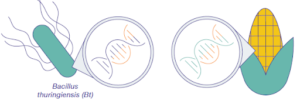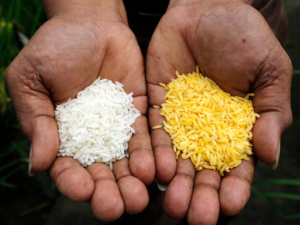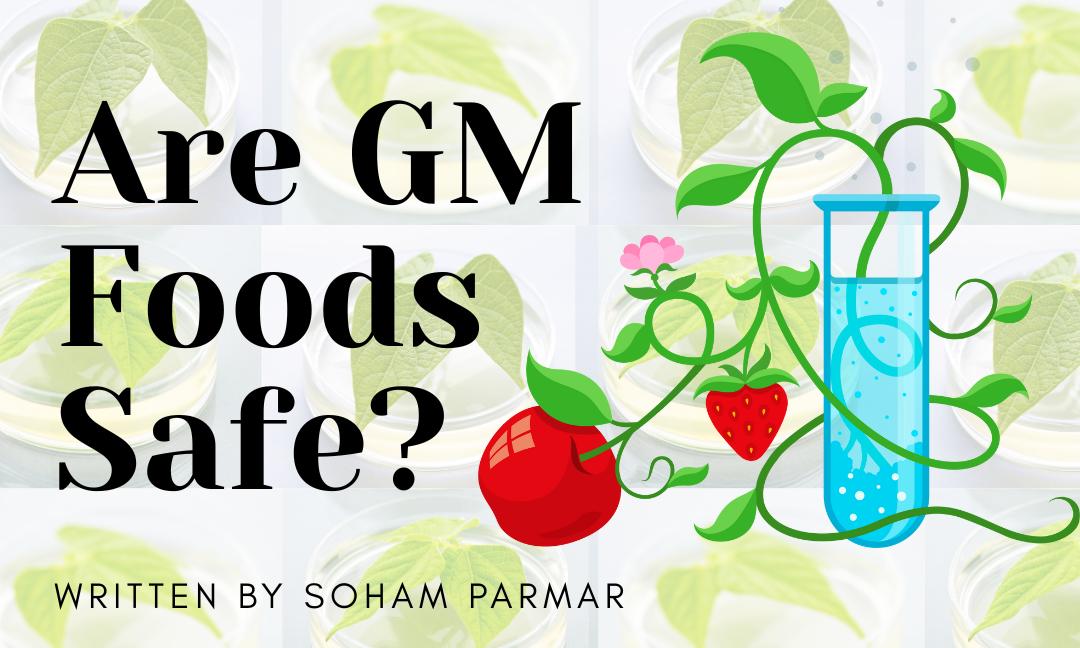Written by: Soham Parmar
Edited by: Liam Statham
Designed by: Kiya Tavascia
Published by: Rayna Almas
Disclaimer: As with all articles published to The Blog, the thoughts, ideas, opinions, and perspectives are of the Youth Writer and not necessarily representative of Youth in Food Systems. The topic of GMOs is a complex one with a set of valid concerns and potential benefits. As an organization, we tend to oppose GMOs due to the environmental and socio-economic implications.
What Are GM Foods?
Genetically Modified foods (GM foods) are foods that come from an organism whose DNA has been intentionally altered using genetic engineering techniques, aiming to introduce beneficial traits like disease resistance, improved yield, or tolerance to herbicides. Some examples of GM foods are corn, soybeans, potatoes, tomatoes and papaya.
How are GMOs Made?
Creating a Genetically Modified Organism (GMO) plant begins with identifying a useful trait, such as resistance to insects, drought, or herbicides.  Scientists then look for an organism—such as a bacterium, plant, or animal—that naturally carries that trait in its genes. Once the desired gene is found, it is copied and then inserted into the DNA of the target plant. This process introduces a new trait into the plant without affecting its other characteristics. The modified plant is then grown and tested in controlled environments, like greenhouses, to confirm that it has the desired trait given to it. If successful, it moves to small-scale and then larger field trials. Finally, before they are ready to be sold to farmers, GMO plants go through in-depth review and tests to ensure they are safe for humans, animals, and the environment.
Scientists then look for an organism—such as a bacterium, plant, or animal—that naturally carries that trait in its genes. Once the desired gene is found, it is copied and then inserted into the DNA of the target plant. This process introduces a new trait into the plant without affecting its other characteristics. The modified plant is then grown and tested in controlled environments, like greenhouses, to confirm that it has the desired trait given to it. If successful, it moves to small-scale and then larger field trials. Finally, before they are ready to be sold to farmers, GMO plants go through in-depth review and tests to ensure they are safe for humans, animals, and the environment.
Pros Of GM Foods
Genetically modified foods offer several important benefits that can help address challenges in agriculture and food security:
- Increased Crop Yields

GM crops are often engineered to resist pests, diseases, and harsh environmental conditions. This can lead to greater and more reliable crop production, helping to feed a growing global population. GM technology adoption has increased crop yields by an astounding 22%.
- Reduced Use Of Chemical Pesticides

Farmers often have to use less spray pesticide when they plant GMO crops. This saves farmers money and reduces the amount of pesticides that end up on crops. Additionally, this can lower environmental pollution and decrease health risks for farmworkers and consumers. On average, GM technology reduces chemical pesticide use by 37%.
- Improved Nutritional Content

Some GM foods are specifically designed to provide added health benefits by improving the nutritional content in them. Golden rice, for instance, has been engineered to provide significantly more vitamin A. Another example is GMO soybeans whose healthier oils can be used to replace oils that contain trans fat; therefore, they can be used as an improved option for cooking and food production.
- Longer Shelf Life
 A major challenge with fresh produce like fruits and vegetables is how quickly they spoil. Through GMO technology, scientists have produced crops that resist spoiling and have a longer shelf life. This reduces the amount of food waste from items that spoil before they can be eaten. By giving consumers more time to purchase and enjoy these foods, less produce ends up being thrown away. Furthermore, it allows farmers and suppliers to ship crops over long distances, helping fresh food reach more people around the world.
A major challenge with fresh produce like fruits and vegetables is how quickly they spoil. Through GMO technology, scientists have produced crops that resist spoiling and have a longer shelf life. This reduces the amount of food waste from items that spoil before they can be eaten. By giving consumers more time to purchase and enjoy these foods, less produce ends up being thrown away. Furthermore, it allows farmers and suppliers to ship crops over long distances, helping fresh food reach more people around the world.
Cons Of GM Foods
While GM foods offer many benefits, it is equally important to recognize that they come with drawbacks. Here are some of the main downsides of GM foods:
- Potential Health Risks
Some people are concerned that GM foods could cause health problems, such as allergies, diseases, or unexpected reactions, because they contain genes from other species. There is a small risk that GM foods could cause an allergic reaction, but this is rare and would only occur if the genetic modification introduces a protein that acts as an allergen. For example, if a gene from a Brazil nut were added to a soybean, someone with a nut allergy might potentially react to products made from that modified soybean. Another concern comes from the use of recombinant Bovine Growth Hormone (rBGH) in dairy cows, which can raise levels of insulin-like growth factor-1 (IGF-1) in milk. Some studies suggest that higher IGF-1 levels may be linked to increased risks of certain cancers, raising questions about the long-term safety of these products.
- Possible Negative Impact on Environment
 GM crops can have unintended effects on the environment. For example, they may cross-pollinate with wild relatives or non-GMO crops, potentially reducing biodiversity. Some genetically modified plants are engineered to resist herbicides or pests, which can lead to “superweeds” or pests that evolve resistance over time. According to EFSA’s guidance on environmental risk assessment, GM plants must be evaluated for possible unintended ecological effects; for example, how the GM crop might persist or become invasive, and whether it could transfer genes to wild relatives or other plants. Additionally, widespread use of certain GM crops may disrupt natural ecosystems and affect soil health, water resources, and surrounding wildlife.
GM crops can have unintended effects on the environment. For example, they may cross-pollinate with wild relatives or non-GMO crops, potentially reducing biodiversity. Some genetically modified plants are engineered to resist herbicides or pests, which can lead to “superweeds” or pests that evolve resistance over time. According to EFSA’s guidance on environmental risk assessment, GM plants must be evaluated for possible unintended ecological effects; for example, how the GM crop might persist or become invasive, and whether it could transfer genes to wild relatives or other plants. Additionally, widespread use of certain GM crops may disrupt natural ecosystems and affect soil health, water resources, and surrounding wildlife.
- Immuno-suppression
 Another major concern is that GM foods may weaken the immune system. A study published in The Lancet reported that rats fed genetically modified potatoes containing the Bacillus thuringiensis (Bt) toxin experienced negative effects on organ development, metabolism, and immune function. While the study was challenged by the biotech industry, many scientists have supported the validity of these findings, suggesting that GM foods could potentially contribute to immune suppression.
Another major concern is that GM foods may weaken the immune system. A study published in The Lancet reported that rats fed genetically modified potatoes containing the Bacillus thuringiensis (Bt) toxin experienced negative effects on organ development, metabolism, and immune function. While the study was challenged by the biotech industry, many scientists have supported the validity of these findings, suggesting that GM foods could potentially contribute to immune suppression.
Are GM Foods Even Safe To Eat?
 Yes. GM foods are carefully studied before being sold to the public to ensure they are safe as non-GMO foods. Most current research has shown that GMOs do not affect people differently than non-GMO foods, and that GMO foods are as healthful and safe to eat as their non-GMO counterparts. Additionally, research shows that GMO plants fed to farm animals are as safe as non-GMO animal food. Internationally, scientists have concluded that GM foods pose no more risk to human health than non-GM foods.
Yes. GM foods are carefully studied before being sold to the public to ensure they are safe as non-GMO foods. Most current research has shown that GMOs do not affect people differently than non-GMO foods, and that GMO foods are as healthful and safe to eat as their non-GMO counterparts. Additionally, research shows that GMO plants fed to farm animals are as safe as non-GMO animal food. Internationally, scientists have concluded that GM foods pose no more risk to human health than non-GM foods.
Final Thoughts
In conclusion, while concerns about health and the environment exist, decades of rigorous research and careful regulation show that approved GM foods are safe to eat. In a world facing climate change, population growth, and food insecurity, GM foods are not just safe—they are a crucial part of the solution for a healthier, more sustainable future.
Bibliography:
Health Canada. (2024, December 5). About novel and genetically-modified (GM) foods. Canada.ca. https://www.canada.ca/en/health-canada/services/food-nutrition/genetically-modified-foods-other-novel-foods.html
Program, H. F. (2024, March 5). Science and history of GMOs and other food modification processes. U.S. Food And Drug Administration. https://www.fda.gov/food/agricultural-biotechnology/science-and-history-gmos-and-other-food-modification-processes
Klümper, W., & Qaim, M. (2014). A Meta-Analysis of the impacts of Genetically Modified crops. PLoS ONE, 9(11), e111629. https://doi.org/10.1371/journal.pone.0111629
Program, H. F. (2024b, March 5). Why do farmers in the U.S. grow GMO crops? U.S. Food And Drug Administration. https://www.fda.gov/food/agricultural-biotechnology/why-do-farmers-us-grow-gmo-crops#:~:text=Farmers%20can%20use%20less%20spray,the%20soil%20to%20control%20weeds.
Admin. (2023, December 18). What are the benefits of GMO crops? Nebraska Corn Board. https://nebraskacorn.gov/cornstalk/food/five-surprising-benefits-of-gmos/
European Food Safety Authority. (2010, November 12). EFSA Guidance Document on the ERA of GM plants. https://www.efsa.europa.eu/en/efsajournal/pub/1879?
Center for Food Safety | GE Food & Your Health | | GE Food & Your Health. (n.d.). Center for Food Safety. https://www.centerforfoodsafety.org/issues/311/ge-foods/ge-food-and-your-health

